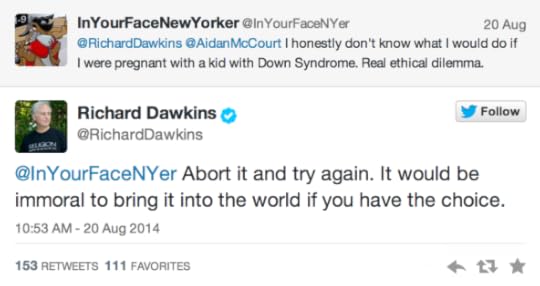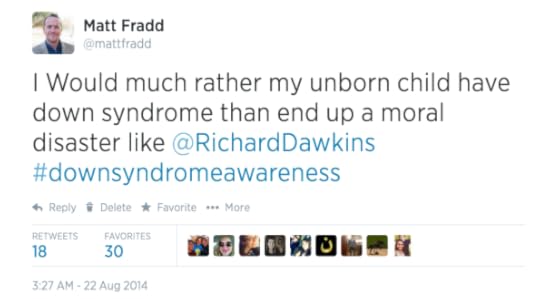Matt Fradd's Blog, page 55
September 24, 2014
Mortal Sin: A Socratic Dialogue
Sam: What do y’all mean when you say “mortal sin”?
Justin: Ah, good question, the Catechism of the Catholic Church says in paragraph 1857, “For a sin to be mortal, three conditions must together be met: ‘Mortal sin is sin whose object is grave matter and which is also committed with full knowledge and deliberate consent.’”
Sam: Is there any Biblical basis for that?
Justin: Absolutely, open up to 1 John 5:16. John writes, “If any one sees his brother committing what is not a mortal sin, he will ask, and God will give him life for those whose sin is not mortal. There is sin which is mortal; I do not say that one is to pray for that.”
Sam: My translation doesn’t say “mortal,” it says, “leading to death.” See? “There is sin leading to death. I do not say that he should pray about that.”
Justin: Well, let’s not get caught up on terminology, it’s the reality it points to that’s important. The point I’m trying to make by referencing that verse is that the Bible does distinguish between sin that is less serious and sin that is grave, mortal, that leads to death.
Sam: We’re getting into the doctrine of once saved always saved again.
Justin: Yes, and I think I showed last time why this doctrine is false and ought to be rejected. But, look, again, let’s drop these phrases like “mortal” and even “once saved always saved” for a moment. I think, sometimes at least, Protestants agree with Catholic teaching but these phrases get in the way. Purgatory, for example, now as a Protestant you seem allergic to that word, but I showed, I think, when we spoke about that, that that concept is utterly Biblical and you, as a “Bible-believing Christian,” ought to hold to it!
Sam: I don’t think a Christian can lose his salvation, Justin. The Father doesn’t un-adopt his children.
Justin: Fine, but the child can reject his Father, can’t he? The prodigal son, even after having been forgiven and welcomed back into the family could have left again, yes?
Sam: Sure, I suppose.
Justin: You suppose? So it’s possible that it may have been impossible for the son to reject his Father a second time?
Sam: Okay, fine, he could have rejected him again. But the thing that bothers me about Catholics is that you seem to think you can lose your salvation as easily as you lose your car keys.
Justin: Which Catholics?
Sam: Catholics I’ve met.
Justin: But I’m asking you, not to wrestle with bad Catholics, but with the teachings of their Church. Let’s not get off track, is it possible that a Christian could reject Christ and be dammed? Turn to 2 Peter 2:20, I want you to read it from your translation.
Sam: You’ve pointed that verse out before.
Justin: Just turn to it and read it for me.
Sam: “For if, after they have escaped the pollutions of the world through the knowledge of the Lord and Savior Jesus Christ, they are again entangled in them and overcome, the latter end is worse for them than the beginning.”
Justin: Sam, is it possible for a person to escape the pollutions of the world through coming to know Jesus Christ but then, later, turn back to the world, become entangled in sin and be lost? Since you’re a “Bible-believing Christian” you ought to believe that this latter end is worse for him than the beginning, when he was an unbeliever. Right?
Sam: I think, yes, I think it is possible to reject Christ after having received him. Let’s say I agree with you . . .
Justin: Not me, the apostle Peter.
Sam: . . . your interpretation of the apostle Peter. If I accept that, and I’m open to that, I don’t think it would be easy.
Justin: Easy to what? Lose your salvation?
Sam: That’s right.
Justin: I agree. So what would it take?
Sam: An outright rejection of Christ. Knowing what he did for you, knowing he is your savior, and yet, as it were, spitting in his face, telling him you don’t want his salvation.
Justin: And would those words be necessary? Would this person need to say, “I reject you Jesus, I don’t want your salvation.” Or could he, in theory, say that, mean that, with his actions. For example, a person might know that adultery, or worshiping idols, or murdering would displease Christ and yet he does it as an act of rebellion against him, could those actions bring about the same end as rejecting him? As you say, spitting in his face and rejecting salvation?
Sam: Well, yes, I’m not saying, there’s this formula you have to say to reject salvation, I guess certain actions could do that, sure.
Justin: What about, say, lying about something trivial. For example, your boss comes into the office and, in front of everyone, asks angrily, “who forgot to refuel the company car?!” And you, though you did it, don’t own up to it.
Sam: That’s ridiculous, obviously not.
Justin: Okay, so the action would have to be very serious then?
Sam: Yes.
Justin: What about a serious action committed by someone who, say, didn’t know that it was wrong. Let’s say for example a person was told all his life that fornication—having sex outside of marriage—was fine. He commits that act, which, I’m sure you’ll agree is a serious sin, but he doesn’t know it’s a sin. Are you telling me he could lose his salvation just because the act is objectively serious?
Sam: No, obviously he’d have to know that it was wrong. That’s why I said it would have to be like saying to Christ, “I know you died for me, I know that you are my savior but I don’t care. I don’t want your salvation.” You can’t say that without knowing that without meaning it. And even if you could, let’s say your were drugged or something, the fact that you didn’t have your wits about you, it wouldn’t count.
Justin: Okay, okay, I see. So let me get this straight. The action has to be serious, not trivial, the person has to know that the action is wrong and choose to do it anyway . . . Well, what about a person who, let’s say, is a drug addict. He comes to Christ and is saved. But what if, since he’s still addicted to cocaine, he ends up using it again. This is a serious action, a serious action which he knows is serious, but does it anyway. Are you telling me this person would necessarily lose his salvation?
Sam: I find it funny that I’m suddenly on the defensive about all this. No! Look, if he was truly addicted, and I’m not a neuroscientist by any stretch of the imagination, but if he’s truly addicted then maybe he wasn’t entirely free, right? And if he wasn’t entirely free then how could you say he’d be damned for that? Even if he knew what he was about to do was wrong.
Justin: I’m just trying to understand your position. So you’re saying that for a person to lose his salvation, the action must be serious, known to be serious, and done freely.
Sam: I mean, I guess, I still have to think this through. I get the sense you’re setting me up here.
Justin: Read this for me. Paragraph 1857.
Sam: “For a sin to be mortal, three conditions must together be met: “Mortal sin is sin whose object is grave matter and which is also committed with full knowledge and deliberate consent.” . . . Is setting someone up in an argument grave matter? If it is I’m pretty sure you’re in trouble.
September 17, 2014
My Debate With Ex-Catholic, Baptist Pastor
Last year I was on my way to Chicago to deliver some talks with Catholic Answers. During the flight I had the opportunity to share the gospel with a man sitting beside me.
After the flight, at baggage claim, a man named Don Smarto approached me, he said that he was sitting behind me and had overheard my conversation.
Don went on to say that he used to be a permanent deacon in the Catholic Church with plans of starting his own religious order! He then informed me that he had since left the Church and was now a Baptist pastor living in Texas.

Don Smarto as a seminarian.
Well, several months after our first meeting I happened to be in Texas, and I contacted Don. He arranged for me to be interviewed on his ABC radio show. A program normally devoted to “parenting today’s youth,” but for me he made an exception.
The title of this post says it was a debate; it wasn’t really, (it wasn’t moderated, we didn’t have equal time to put forth our cases for and against a proposition), it was more of a lively discussion in which we talked about what unites us, and what divides us.
In our discussion we talk on a broad-range of topics:
- The Problem of evil
- What is the Church
- The Protestant reformation
- Why to Catholics believe in the real presence of Jesus in the Eucharist
- The authority of the Catholic Church
- Pornography
- Abortion
. . . and much more. It’s about 70 minutes long, so go grab a coffee (or 5), and enjoy!
http://mattfradd.com/wp-content/uploads/2013/04/parenting_today_s_youth-1366460871.mp3
I hope you’ll share this talk with your friends (Catholic and non-Catholic alike), as an example of how we can disagree without being disagreeable, and argue without being argumentative.
* Thinking on my feet, I accidentally said that it was the first council of Constantinople which defined Mary as Theotokos, instead of Ephesus in 431. #Humility
August 22, 2014
Queen of Heaven: A Socratic Dialogue
 Happy Feast of the Queenship of Mary!
Happy Feast of the Queenship of Mary!
Have you ever been asked why on earth it is Catholics refer to Mary as “Queen”?
If so, you might find this short dialogue helpful: Read my other dialogues here.
Sam: Why do you call Mary a queen?
Justin: Because she is the mother of Jesus who, we believe, is a king, the king of the universe.
Sam: Well I believe Jesus is the one true king also but I don’t believe Mary is a queen.
Justin: Why not?
Sam: Well, for starters, she wasn’t married to Jesus! For obvious reasons.
Justin: Sure, 1. Jesus was celibate, and 2. Mary was his mother. But what you seem to be implying is that a queen is necessarily the wife of a king, yes?
Sam: Well, yes.
Justin: This is how we understand it in the west, but in the ancient near east, this wasn’t the case. The queen was always the mother of the king. One of the reasons for this was that those in the ancient near east practiced polygamy. Solomon, for example, had 700 wives and 300 concubines! (1 Kings 11:3) 700 queens? Can you say, “cat fight”?
Sam: Didn’t think of that. Good point. But show me all this in Scripture.
Justin: Do you have a Bible? Compare 1 Kings 1:15-16 where Bathsheba is the wife of King David to the very next chapter, 1 Kings 2:19 . . . Read it aloud.
Sam: Okay, 1 Kings 2:19 says, “So Bathshe′ba went to the king into his chamber (now the king was very old, and Ab′ishag the Shu′nammite was ministering to the king). Bathshe′ba bowed and did obeisance.”
Justin: Now turn to the next chapter where her son, Solomon, is king and she is now queen. Verse nineteen.
Sam: Okay, “So Bathshe′ba went to King Solomon, to speak to him on behalf of Adoni′jah. And the king rose to meet her, and bowed down to her; then he sat on his throne, and had a seat brought for the king’s mother; and she sat on his right.”
Justin: Interesting, huh? This was always the case in the Davidic monarchy.
Sam: Alright, well that was with the Davidic monarchy, why think it continues with Jesus.
Justin: Because Jesus is the new David! The angel said to Mary, “He will be great, and will be called the Son of the Most High; and the Lord God will give to him the throne of his father David.” So if the queen is the mother of the king, and Jesus is the true and rightful king, is it crazy for me to think of his Mother as a queen?”
Sam: I guess not, but you pray to her, right? I find that weird.
Justin: Well now we’re talking about the intercession of the saints, and that’s a different thing. I think there is good Biblical support for this, but I have to get going. Perhaps we can talk about it next time.
Sam: Sounds good. Bye.
Richard Dawkins: It’s Immoral Not To Abort Downs Syndrome Children
 Richard Dawkins—that atheist who wrote that book on atheism—is now “seen by many, even many non-believers, as a joke figure, shaking his fist at sky fairies. He’s the Mary Whitehouse of our day.” [1]
Richard Dawkins—that atheist who wrote that book on atheism—is now “seen by many, even many non-believers, as a joke figure, shaking his fist at sky fairies. He’s the Mary Whitehouse of our day.” [1]
Despite his waning popularity (or because of it), he seems intent on remaining in the public eye. His strategy seems to be to say as much stupid and insulting crap as possible. He is succeeding in this strategy.
His latest doozy? Telling one of his female twitter followers that if she was to discover her baby had Downs Syndrome, it would be immoral for her not to abort it.
It’s ironic, isn’t it? The same bloke who has the nerve to tell us that raising our kids Christian is a form of child abuse, [2] thinks that not killing our children if they have Downs is immoral.
Thankfully many of his followers on Twitter objected:
 Here’s what someone who is not (and never will be) one of his follower said:
Here’s what someone who is not (and never will be) one of his follower said:
Here’s a great article from man who has a daughter with DS demolishing Dawkins’s insulting and wrong claims.
———-
[1] “Richard Dawkins has lost: meet the new new atheists”, http://www.spectator.co.uk/features/8...
[2] “[I]sn’t it always a form of child abuse to label children as possessors of beliefs that they are too young to have thought about? Yet the practice continues to this day, almost entirely unquestioned.” (From that book on atheist, pg. 315).
August 18, 2014
A Loving God And The Existence of Hell: A Socratic Dialogue
Note: These dialogues are contrived, obviously. I’m interested, not so much in writing a conversation as it would actually occur (real conversations about important topics are messy and almost never this brief), but one that demonstrates the superiority of the Christian position to atheistic ones (surprise!) Because of this, the Christian, Sarah, almost always comes off as cleverer and righter (an actual word that doesn’t work in this context). Given that this is a Catholic apologetics site, this shouldn’t come as a surprise. If it does, and you’re deeply offended, go here for three minutes before reading further.
Brad: You’re reading Thomas Nagel?
Sarah: Do you know who he is? Hi, by the way.
Brad: Hi. Ah, yeah, atheist philosopher dude who wrote, well, that. Why are you reading it?
Sarah: Because he’s brilliant. And honest. … And I have to for class.
Brad: Good for you. I Just finished chatting with some Mormon boys—can’t really call them men—who showed up on my door this morning. Love when that happens!
Sarah: Ah, me too!
Brad: It seems to me like Christians—and I apologize if this offends you—believe because it’s comforting. You like the idea of there being a Daddy up in the sky whose going to take care of you forever. They had no answers to any of my objections, just kept talking about how our families can be reunited in the afterlife.
Sarah: Technically Mormonism isn’t a Christian religion, but I’ll let that slide since you’re an infidel.
Brad: Wow! Haven’t had your coffee this morning, huh?
Sarah: I agree with you that we shouldn’t believe things that are false because they feel good or comforting, but you’re committing the genetic fallacy again, Brad. You’re saying, “Christians like the idea of there being a ‘dad up in the sky,” and you’re concluding from that that God doesn’t exist, or, at least, this in someway counts against belief in God.
Brad: All I’m saying is, we atheists can at least be acquitted for the charge of wishful thinking.
Sarah: Perhaps Atheists don’t like the idea of having to submit to an all holy God. Perhaps they detest the idea of Hell and that’s why they are atheists. If that is the case then you might not be so easily acquitted after all.
Brad: And now you’re committing the genetic fallacy.
Sarah: No, because I’m not saying, “Atheists have bad reasons for being atheists therefore atheism is false.” I’m saying that it might be the case that some atheists remain atheists, or become atheists, because they don’t like what theism entails. Take Nagel, for example. Check this out, he writes:
“I speak from experience, being strongly subject to this fear myself.” He’s talking about fear of religion. He goes on: “I want atheism to be true and am made uneasy by the fact that some of the most intelligent and well-informed people I know are religious believers. It isn’t just that I don’t believe in God and, naturally, hope that I’m right in my belief. It’s that I hope there is no God! I don’t want there to be a God; I don’t want the universe to be like that.”
Brad: I agree with him.
Sarah: I know. And you wanting the world to be a certain way, namely, Godless, isn’t a good argument for the existence of God is it? If I were to say, “because you want there not to be a God, because you want there not to be a Hell, therefore God exists, that would be a hopelessly bad argument.”
Brad: Agreed.
Sarah: In the same way, Christians want there to be a God, and perhaps some of them want there to be a God solely because it brings them comfort, but this isn’t a good argument for atheism.
Brad: Agreed!
Sarah: Good! Then stop banging on about it like it is.
Brad: Seriously though, let me get you a coffee. I need one too.
***
Brad: There you are. I seriously find it hard to believe that an intelligent woman like yourself could believe in something like Hell.
Sarah: Why?
Brad: Because it’s so ridiculous. I mean, if you were going to start a religion and wanted people to believe you, threatening them with eternal punishment in Hell if they don’t would be a great strategy.
Sarah: Maybe, but that wouldn’t disprove the existence of Hell, would it?
Brad: Do you mind if I call you infuriating?
Sarah: Not at all.
Brad: You’re infuriating.
Sarah: What exactly do you think Hell is?
Brad: False.
Sarah: Good one. Let me rephrase the question. What exactly do you think Christians mean by Hell?
Brad: A cave deep in the earth here people go to burn, Reserved primarily for homosexuals and heretics.
Sarah: Okay, I’ll ignore the red herring about homosexuals and move on. It’s true that The Bible does use images such as fire and darkness to communicate what hell is like, but these images point to the suffering condition of those who have finally rejected God, who is the source of all happiness. Pope John Paul II, who I think they made a saint or something recently, I don’t know, I’m not Catholic. He had this great quote. He said that those images “show the complete frustration and emptiness of life without God. Rather than a place, hell indicates the state of those who freely and definitively separate themselves from God, the source of all life and joy.”
Brad: Nothing but scare tactics, I’m sorry. Be a good little boy or else you’ll suffer forever! I thought this God of yours was supposed to be all-loving.
Sarah: Would you be more inclined to think Christianity was true if Hell was not one its doctrines?
Brad: Well, no, because I think Christianity is hocus-pocus bull crap.
Sarah: Charming.
Brad: But it would be more believable I guess, especially since, as I said, this God is suppose to be all loving.
Sarah: Do you believe in free-will?
Brad: If you’re about to tell me that people freely choose Hell then I’m afraid I’m going to find that unconvincing. Who in their right mind would choose eternal suffering forever.
Sarah: I don’t know, people like Thomas Nagel who don’t want there to be a God? People like the late Christopher Hitchens who said he’d be depressed if God existed? The point it this: If God is love, as Christians believe, and humans have free will, as Christians believe, then you have to have at least the possibility of Hell.
Brad: Wait, the possibility? Are you saying Hell not exist? Or that no one is there?
Sarah: I didn’t say that. I believe Hell exists and that there are people there.
Brad: Charming
Sarah: I’m saying if you want to deny the possibility of Hell, then you first need to deny either God being love or humans having free will.
Brad: Why?
Sarah: God doesn’t wish that “any should perish, but that all should reach repentance.” That’s from 2 Peter 3:9, in case you were wondering.
Brad: Oh great, I’ll look it up when I get home.
Sarah: Sarcasm. Well done.
As I was saying, if humans have free will, then there is the possibility of their rejecting God’s love. Thus you might say that God did not create hell. Rather, sin created hell. As Lewis wrote, “There are only two kinds of people in the end: those who say to God, ‘Thy will be done,’ and those to whom God says, in the end, ‘Thy will be done.’ All that are in hell, choose it.”
We might be tempted to think that a loving God could never let people suffer for eternity in hell. But, far from being inconsistent with God’s loving nature, hell is a necessary consequence of it. Because God is love, he respects our freedom—for love is never coercive. If God forced his love on us, he would not be perfectly loving and thus wouldn’t be God.
Brad: Can I show you a meme my friend sent me today?
Sarah: sure.
Brad:
Sarah: And this to you seems like a good objection to my argument for Hell based on God’s love and our freedom?
Brad: I was just hoping to see that vain on the side of your head come out again.
Sarah: Did it?
Brad: Take a look at the meme again.
Sarah: Send this to your friend, tell him that when thinking about important matters like God, free will, and judgement, it would be more productive for him to use his head, instead of his unbridled emotions.
July 29, 2014
10 Awesome Catholic Tees
One easy/effective way to evangelize is by wearing a Catholic shirt. Below are 10 awesome one’s from Mantled Catholic Media. I met the guys at MCM at a recent conference and was even more impressed by their apostolic zeal than I was their fantastic tees!
On the inside of each of their shirts is printed a scapular! Check it out:
So here are ten of my favorite Catholic teens (in no particular order).
1. Lion Breathing Fire
This tee has an image of a mighty lion breathing fire on the front.
Definitely a conversation starter!
On the back is the quote that the design references: “Let us then return from that table like lions breathing fire, having become terrible to the devil.” – St. John Chrysostom
Respect Your Mamma
The front of this tee states “Respect Your Mama” with the scripture John 2:1-11 (The Wedding at Cana) underneath.
This gospel passage shows how Jesus Himself respected and listened to His mother, Mary.
On the back of the shirt is an image of the Virgin Mary with the text “Behold Your Mother” and a reference to John 19:26-27. Those verses later on in the same gospel is where Christ uses one of his agonizing breaths on the cross to give Mary to us as our Mother through the Beloved Apostle, John.
3. God Loves Haters
The front of this tee refers to Matthew 5:43-45 in Scripture with the text God Loves Haters above it.
Get it!
4. Viva Cristo Rey
 Be a Cristero with this bold tee! The front has the large, bold text “¡Viva Cristo Rey! ¡Viva la Virgen de Guadalupe!” in the Mexican flag colors as a testament to the battle cry of the Cristeros during the bloody Cristero War (1926-1929).
Be a Cristero with this bold tee! The front has the large, bold text “¡Viva Cristo Rey! ¡Viva la Virgen de Guadalupe!” in the Mexican flag colors as a testament to the battle cry of the Cristeros during the bloody Cristero War (1926-1929).
On the back is a quote from one of the many martyrs from this conflict, Blessed Miguel Pro, “We ought to speak, shout out, against injustices with confidence and without fear. We proclaim the principles of the Church, the reign of love, without forgetting that it is also a reign of justice.”
5. St. Philomena
This V-neck fitted ladies tee has a tattoo-style print of St. Philomena on the front with the text “Pray for Us”. On the back there is one of the prayers used for her intercession to God.
To read about this amazing saint, go here
Get it!
6. Silenced

This intense black tee makes a bold proclamation against abortion. The front is a skull comprised entirely of babies in the womb with red X’s through them and the text “Silent Today, Silenced Tomorrow”. The back is statistics and a poignant question:
“46 million babies die from abortion worldwide every year. That’s approximately one baby being aborted every two seconds. How long has it taken you to read this?”
Take an uncompromising Catholic, pro-life stance with this tee.
Get it!
7. Prayer Warriors

The front of this tee is an oversized image of Our Lady in battle with the devil using one of the greatest tools in spiritual warfare…the rosary! Show your love of Mother Mary with this epic tee portraying her as the superhero she is!
The back of the tee labels the wearer as a “Prayer Warrior” with a quote from Pope Adrian VI, “The Rosary is the scourge of the devil.”
Get it!
8. Holy Mary, Undoer of Knots

This tee has an image of a knotted rope soaked with blood representing the knots we tie our hearts up in during the struggles of our everyday lives. Our Mother Mary is known as the Undoer of Knots because when we let her into our lives and entrust our knotted up messes to her Son, Jesus, things become simpler and miracles happen!
Along with the text “Holy Mary, Undoer of Knots. Pray for Us”, there are twelve stars representing Mary’s crown from the Book of Revelation and the prayer from her novena.
9. St. Michael the Archangel

The front of this tee is an image of St. Michael the Archangel. The print is done in white, gunmetal grey, antique gold and silver foil. On the back is the St. Michael prayer.
Get it!
10. Revolution

This design is styled after modern graffiti art showing St. Peter, St. Paul and St. John as revolutionaries wearing bandannas. There is a reference to Acts 1:8 “But you will receive power when the holy Spirit comes upon you, and you will be my witnesses in Jerusalem, throughout Judea and Samaria, and to the ends of the earth.”
Get it!
So! Which was your favorite?? Tell us below!
July 15, 2014
Is God a Silly Idea: A Socratic Dialogue
In their last discussion, Sarah explained why she’s within her epistemic rights to deny the existence of a teapot orbiting the sun, because, among other reasons, the idea was silly. Read that discussion here. This discussion follows from that.
Brad: Alright, I’ll take you up on your offer. I’ll let you know why I think your God is silly.
Sarah: Okay.
Brad: Well, first of all, it would probably help if you define what you mean by God. People have all sorts of whacky ideas about God, I can’t tell you why your God is silly unless you define him.
Sarah: Umm … the all-good, all-powerful, all-knowing, supernatural creator of the universe? That’s off the top of my head, there’s probably a better definition, but that might do for now, yes?
Brad: So God knows all things?
Sarah: Yes. He knows everything that is happening, has happened, or will happen.
Brad: Yeah, I’m sorry, I find that ridiculous.
Sarah: You don’t have to be sorry, you just have to offer an argument. Why do you think God—so defined—is ridiculous?
Does God Know What It’s like to be Afraid
Brad: Well … Okay, If God knows everything then he knows what it’s like to be afraid. Right? But if he knows what it’s like to be afraid how can he be all-powerful?
Sarah: God knows what it’s like for me to be afraid, and he knows what it’s like for you, but God doesn’t know what it is like for God to be afraid because God is perfect.
Brad: If he’s perfect, perfect in knowledge, he should know that, but, according to you, he doesn’t. This is one of the many examples I could give to show why your God is incoherent.
Sarah: I disagree.
Brad: Shocking!
Sarah: Well, I could agree with you if it would make you feel better but then we’d both be wrong.
Brad: You’re a Sassy little Christian aren’t you.
Sarah: You’re arguing: God isn’t able to experience imperfect emotions, therefore God isn’t all knowing.
Brad: Something like that.
Sarah: But God is by definition a perfect being. And a perfect being can’t experience pain or loss. And if he can’t experience pain or loss then he can’t experience fear . . .
Brad: And that’s another thing, why are you so certain he’s a he.
Sarah: Either that was an intentional red herring or you need to get back on decaf. . . . As I was saying, if God cannot experience pain or loss then he can’t experience fear. To say that he should know what it is like for him to be afraid is simply meaningless. And since it’s meaningless it can’t be true. And since it can’t be true, it can’t be known. And since it can’t be known, it can’t contradict his omniscience. [1]
Can God Create a rock too heavy for him to lift?
Brad: Okay, what about this one; I’m sure you’ve heard it before. If God is all powerful, which you’ve already said you believe, can he create a rock so heavy that even he can’t lift it. If he can’t create a rock that heavy then he isn’t all powerful. If he can but can’t lift it he isn’t all powerful.
Sarah: Well wait a minute. Are you conceding the point? Do you see why God’s inability to experience fear doesn’t contradict him being all-knowing?
Brad: I’m not conceding anything, Sarah. I’ll chew over what you’ve said. But if you’re okay moving on for now, Can God create a rock too heavy for him to lift or not?
Sarah: What do you think omnipotence means?
Brad: The ability to do anything.
Sarah: That explains why you think this is a good objection to God’s omnipotence. Just as God’s omniscience doesn’t entail that he knows logical contradictions—such as what it’s like for him to worship God—God’s omnipotence doesn’t mean the ability to do things that are meaningless. God can’t create a God for him to worship. God can’t lie—to do so would contradict his nature. God can’t create a square circle, because a square circle isn’t anything.
Brad: That’s all fine, but creating a rock too heavy to lift isn’t meaningless, nor, I don’t think, does it contradict his supposed nature.
Sarah: I’ll have to give that some more thought. . . . But, in asking “can God create a rock too heavy for him to lift”, you’re essentially asking, “can an all-powerful being create something that he cannot control”, but an all-powerful being would have an infinite amount of lifting power, right? So anything too heavy for such a being to lift would have to have more than infinite weight. But “more than infinite” is one of those combinations of words that contain a logical impossibility. It’s a nonsense phrase that can’t correspond to anything in reality or in our imagination.
Brad: Interesting stuff. Alright, I gotta go. Would you like me to see if the barista can make a coffee too hot for you to drink?
Sarah: I would like you to see if the barista can make a chai latte that is not too hot nor too cool. Thanks.
———-
[1] I stole this line of reasoning from my friend Trent Horn’s book, Answering Atheism.
July 10, 2014
Is God a Body? Mormonism Vs. Aquinas
 Mormonism teaches that God has a body. Christianity teaches that he does not.
Mormonism teaches that God has a body. Christianity teaches that he does not.
This short post is meant to be a discussion generator, not a comprehensive refutation, so leave your comments below!
Let’s look first at what Mormon scriptures say about God’s corporeality and then look at three arguments put forth by Aquinas which aim to refute this idea:
God has a body
“The Father has a body of flesh and bones as tangible as man’s; the Son also; but the Holy Ghost has not a body of flesh and bones, but is a personage of Spirit. Were it not so, the Holy Ghost could not dwell in us.” D&C 130:22
God does not have a body
In his Summa Theologiae (I.3-4), Thomas puts forth three arguments for why God is not a body.
Unmoved Mover
1) No body is in motion that was not first put in motion by another. But God was not put in motion (he is the “unmoved mover”). Therefore God is not a body.
First Being
2) “The first being”, writes Thomas, “must of necessity be in act, and in no way in potentiality.” This, he says, is because nothing can actualize it’s own potentiality. If a thing could actualize it’s own potential, it would have to exist prior to itself (such as when cold air, existing prior to water freezing, actually freezes water) which is absurd.
So, the question is, is God—the God Mormons on planet earth are bound to worship—the first being or not? If he is, then, to quote Thomas, ” It [would be] impossible that in God there should be any potentiality”, and thus God would not be a body.
If he is not the first being, (which seems to be the dominant position in LDS theology [1]) then either there is a finite series of “gods” which lead back to a first being who is God (and thus immaterial) or else we seem to be stuck with an infinite regress (God had a God who had a God who had a God who had a God …) with no first God to “get the ball rolling.”
The Most Nobel of Beings
3) God is the most noble of beings (a premise no Mormon would deny). But it is impossible for a body to be the most noble of beings. Why? Because a body can either be alive or dead. And an alive body is more noble than a dead one. But the reason for a body’s “aliveness” is that it depends upon another thing (if it did not then all bodies would be alive). What is that thing that bodies rely upon to be animate? the soul (which is immaterial).
Thomas concludes: “Hence that by which a body becomes animated must be nobler than the body. Therefore it is impossible that God should be a body.”
———-
[1] “Well, who was His [Jesus’] father? Why God was His father; and who was God’s father? Why God had a father like you and I have.” – George Q. Cannon (served in the First Presidency of the Mormon church).
June 25, 2014
Does Evil Disprove God?
Last week I had the honor of being on Patrick Madrid’s Right Here Right Now show where we discussed, with the great Peter Kreeft, the problem of evil. Click the play button above to listen to our interview. (mp3 link here).

As I’m reading a lot of Thomas Aquinas right now, I thought, in addition to providing the link so you could hear the discussion, I would respond to Jack’s argument (not that he stated it explicitly but this is what I think he’s saying) in the way Thomas responded to his objectors in his Summa Theologica: I respond to this problem in greater length in my new book 20 Answers: Atheism.
Article 1. Whether evil and suffering are incompatible with an omnipotent, omnibenevolent, and omniscient God?
Objection 1. God is believed to be omnipotent, omniscient and omnibenevolent. But If God were omnipotent he could eliminate evil and suffering.
Objection 2. Further, if God were omniscient he would be aware of evil and suffering.
Objection 3. Further, If God were omnibenevolent he would desire to eliminate evil and suffering. However, Evil exists. Therefore it follows that God does not exist, or, if he does exist, he is either weak, ignorant or wicked.
On the contrary, Far from disproving God’s existence, evil actually points to God’s existence in an indirect way. If genuine evil exists then it follows that objective morality exists. If objective morality exists then it follows that God exists.
I answer that, in order to show that an omnipotent, omnibenevolent, and omniscient God is not logically incompatible with evil and suffering, one need simply offer an additional premise, “God may have morally sufficient reasons for permitting evil and suffering.” As long as this premise is possible it proves that evil, and suffering and God are not logically incompatible. Further, since God is able to bring good out of evil, we must be prepared to acknowledge that this is what he is doing–as the Christian faith claims. As St. Paul says: “We know that in everything God works for good with those who love him” (Romans 8:28).
Reply to objection 1. Omnipotence does not mean the ability to do the intrinsically impossible. For example, it is possible for God to create beings with the kind of free will that can choose between good and evil, but it is not possible to force those creatures to freely choose good, for that is a self-contradiction. If he forced their choice, it wouldn’t be free.
Reply to to objection 2. Because God is omniscient, he knows many things we do not. This means that he may, in fact, have good reasons for permitting things–like evil and suffering–that seem inexplicable to us. Because of the limitations of our own perspective, we must acknowledge that we may be in the same position as a small child being taken to the doctor for his injections. The child may be very afraid of getting an injection, and he may be too small to understand why his own parents–who normally take care of him–are suddenly holding him down and allowing the doctor to do what he perceives as horrible. But in fact the injection can keep him from getting a disease that would lead to much more suffering, and thus there is a greater good that he is unable to recognize.
Human beings have a very limited vantage point and we often lack knowledge of things true significance. What appears to us to be a tragedy may have effects that bring about great good, and on the flipside, what appears to us as a great good may, in the long run, prove harmful. From our limited reference point, we are often simply not in a good position to judge. Because of this, we have to recognize that a being with more knowledge than us–like God–may have good reasons for things that we are unaware of.
Reply to objection 3. As we think about the omnibenevolence of God, we must be careful not to impose an inadequate understanding of goodness on him.
In his book, The Problem of Pain, C.S. Lewis writes, “By the goodness of God we mean nowadays almost exclusively his lovingness; and in this we may be right. And by love, in this context, most of us mean kindness. . . . What would really satisfy us is would be a God who said of anything we happened to like doing, ‘What does it matter so long as they are contended?’ We want, in fact, not so much a Father in heaven as a grandfather in heaven–a senile benevolence who, as they say, ‘liked to see young people enjoying themselves’ and whose plan for the universe was simply that it might be truly said at the end of each day, ‘a good time was had by all.”[1]
But Christians do not believe that God created us merely for happiness in this life. Rather, as the Baltimore Catechism says: “God made us to show forth His goodness and to share with us His everlasting happiness in heaven” (BAL 3).
—
[1] C.S. Lewis, The Problem of Pain: (New York: Harper Collins, 2001), 31.
June 19, 2014
God & Flying Teapots: A Socratic Dialogue
This is the second conversation between Sarah and Brad. Read their first one here.
Brad: Sarah. Hey. It’s Brad.
Sarah: Oh, hey Brad. It’s nice to see you in a different shirt today. Green Lantern?
Brad: Yes! DC fan?
Sarah: Yes, actually. Although the film they did with Ryan Reynolds was enough to make me throw up and convert to Marvel. Awful movie.
Brad: Agreed! Speaking of converting, where’s all your Bible study friends?
Sarah: We meet on Saturday mornings.
Brad: I’m fearful that one day I’ll walk in here and they’ll douse me with Holy Water or something.
Sarah: Yeah, that’s a Catholic thing. We’re not Catholic. The most you should expect from us is a sympathetic look and a “I’ll pray for you.”
Brad: Oh dear! Well, the coffee’s so good here, I’m not sure even that could scare me away. Speaking of coffee; I need one. Mind if I join you?
Sarah: Sure.
Brad: Can I get you anything?
Sarah: Sure, thanks. A Chai Latte?
Brad: You got it.
…
Brad: There you go. I enjoyed our discussion last week.
Sarah: Yeah, me too.
Brad: It got me thinking about who has the burden of proof and all that. Have you heard of Russell’s teapot?
Sarah: I’m vaguely familiar with it; refresh my memory.
Brad: He basically said, suppose I believed that there was a teapot orbiting the sun between Earth and Mars.
Sarah: Okay…
Brad: Well, let’s pretend I do think that. Sarah, there is a teapot orbiting the sun between Earth and Mars.
Sarah: I should have got an extra shot of espresso.
Brad: Please don’t mock my faith, Sarah.
Sarah: Ha! Okay, I’ll play along. What reason do you have to think that there is a teapot orbiting the sun.
Brad: Hold on a minute! Are you telling me that you don’t believe in this teapot? That you’re an a-teapotist?
Sarah: I mean, I guess it’s possible? But no. Unless you can give me a good reason to think it’s true, I don’t believe in your orbiting teapot.
Brad: Would you be willing to say there is no such teapot?
Sarah: Yes.
Brad: Ah, so you must have reasons for thinking the teapot doesn’t exist. You are, after all, making a positive claim there Sarah. You’re saying there is no such teapot. You see, last week you told me I couldn’t be an atheist, couldn’t say there was no God, unless I had a reason . . .
Sarah: I didn’t say you couldn’t deny the existence of God without a reason. I said if you’re to justify your position to me then you need to give me a reason for your position.
Brad: And yet here you are doing the same thing about the teapot. You say it doesn’t exist and yet you have no justification for that.
Sarah: Continue.
Brad: Well, for me, God is like that. He’s a superfluous hypothesis. Look, I’m not here to insult you. I like you! You’re more thoughtful than most Christians I meet, but your God seems as ridiculous to me as my teapot seems to you.
Sarah: But wait a minute, Brad. You seem to be saying, to claim that a thing exists, soley because there’s no reason to think it doesn’t, is not a good reason to think that it does. Right?
Brad: I think that’s what I said, but that was a mouthful; let me try. I’m saying, if I genuinely believed in this teapot, and my only reason for thinking that it exists is that no one could disprove it, that would be a bad reason for thinking the teapot exists. You follow?
Sarah: I follow. And I see the flaw in your argument. Two points: First, Christians—at least thoughtful ones—don’t believe in God because “you can’t prove me wrong.” They have reasons for thinking that God exists. And secondly, I do have a reason to think that this teapot doesn’t exist. I don’t deny it simply because of a lack of evidence. I deny it because I think there’s good evidence against it! I think we have good evidence that no such piece of china has been launched into space by us. . . .
Brad: . . . Maybe it was put there by aliens.
Sarah: Okay, it’s plausible. But I mean, it’s silly. It’s silly to think that a life form intelligent enough to create a teapot would think it worth their time to launch that teapot into our solar system. I mean, why bother?
Brad: Maybe it’s an alien probe, transmitting data back to their planet. Maybe they plan an attack and need to know what they’re up against!
Sarah: Wait, the teapot is a probe? Or there’s a probe inside the teapot?
Brad: … Don’t look now but there’s a table of teens behind you with the queerest look on their faces.
Sarah: Ha! I suppose it’s not everyday you hear “probe” and “teapot” in the same sentence.
Brad: Hahaha.
Sarah: Look, if you had said to me, “do you think it’s possible there is an alien probe orbiting the earth right now, too small be detected by any human telescope, which is transmitting data to a far off planet?” I would have said, I don’t know. This, I think, shows that the reason I deny your teapot but accept the possibility of the alien probe, isn’t because of its implausibility but because it’s silly.*
Brad: Fair enough. I think your God is silly. Again, not trying to be argumentative, just being honest.
Sarah: I know, and I appreciate that. But I gave a reason to think your teapot is silly. Now it’s your turn. Why is God silly?

* I got this implausibility/silly distinction from Trent Horn’s fantastic book, Answering Atheism.
Matt Fradd's Blog
- Matt Fradd's profile
- 168 followers


















